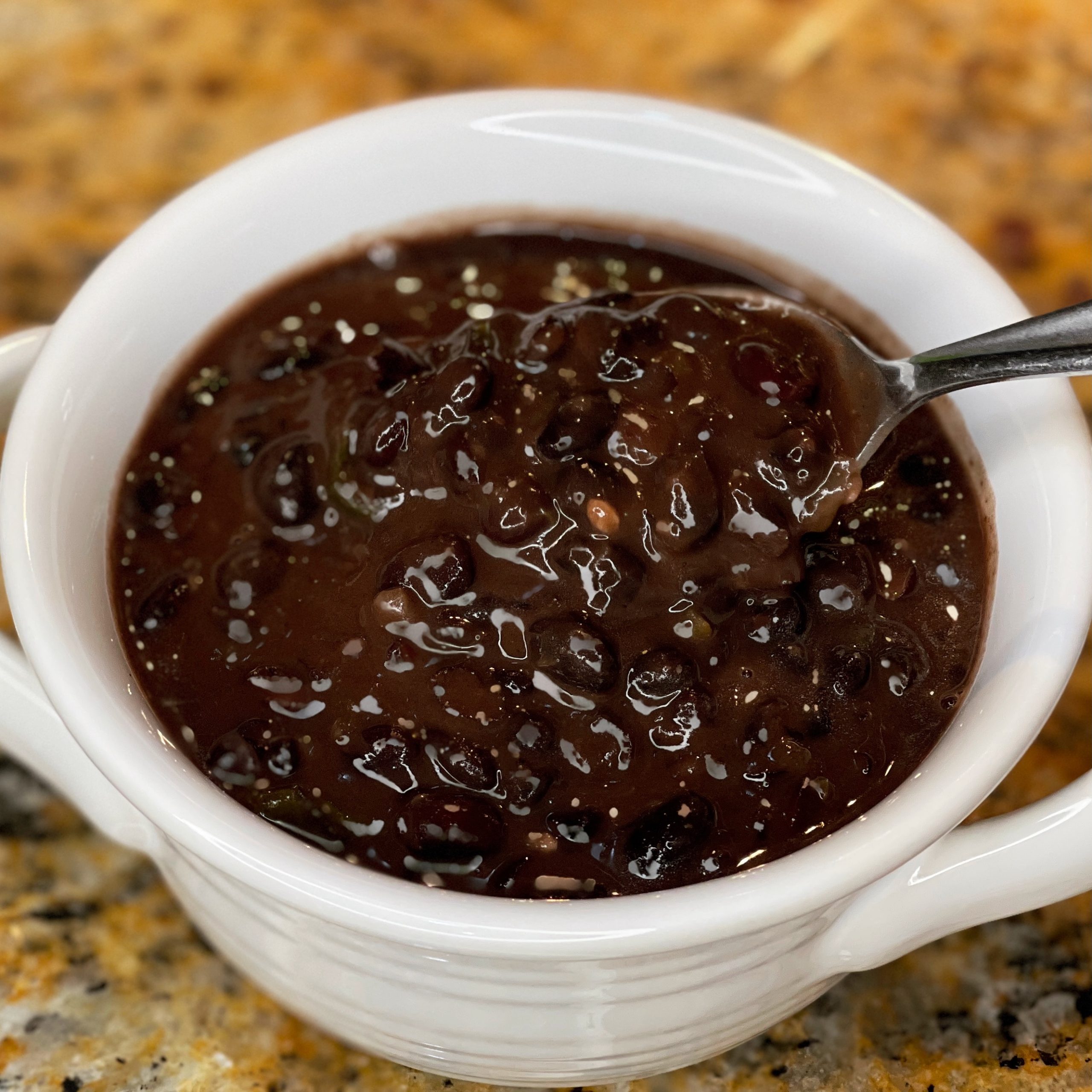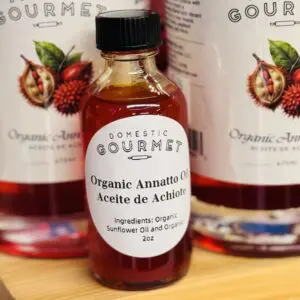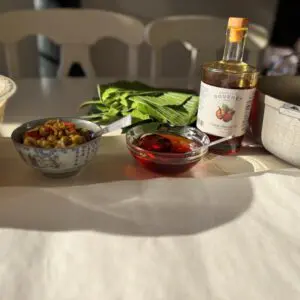Sometime around 2011, my then-boyfriend (now my husband) told me he would propose if I learned to make frijoles negros (black beans). Only one woman was willing to teach me, show me the way, and share all her recipes: my Tía Lourdes.
A Culinary Crash Course in Miami: Frijoles Negros Edition
I’ll never forget driving down to her house in Miami to spend a week with her so she could teach me traditional Cuban recipes, in the name of love. I had never truly been in love before, and I remember telling her all about Miguel and how I wanted to learn to cook for my boyfriend, who loved Cuban food. She gave me all the cooking advice and taught me the foundations of our culture’s food.
My Tía Lourdes gave me her time, her wisdom, and her kitchen. She passed down more than Cuban recipes—she gave me the foundation of our culture’s food and a connection to generations of women who cooked with heart and purpose.
The Moment I Knew I Got It Right
I returned from that trip with a small arsenal of recipes. When I made her frijoles negros for Miguel, he just looked at me, and I knew I had nailed them. I remember nodding, sticking out my hand, wiggling my ring finger, and saying, “Size 7.”
From Family Recipe to Cultural Legacy
In honor of my Tía Lourdes and that memory, I’m sharing with you the most treasured written recipe in my collection. This dish isn’t just food—it’s part of my love story, part of my heritage, and now, hopefully, part of your kitchen too.
It also planted the seed for something even bigger: the desire to preserve and celebrate our culture through food. That journey led to the creation of Domestic Gourmet Organic Annatto Oil (Aceite de Achiote)—a global pantry staple in so many kitchens, reimagined for modern cooks who want both tradition and quality.
From her stovetop to mine, and now to yours—thank you for being part of this story.
iBuen provecho!
We independently select all of the products we feature on Domestic Gourmet and may earn an affiliate commission when you purchase through links on this site.

Tía Lourdes’ Cuban Frijoles Negros (Black Beans)
Ingredients
- 1 lb dried black beans
- 1 green bell pepper
- 2 bay leaves
- 2 tsp table or kosher salt
- ½ tsp pepper
- ½ cup Spanish olive oil
- 1 Spanish onion
- 4-6 cloves garlic
- 5-7 ají cachucha (sweet chili pepper)
- ½ tsp ground cumin
- ½ cup vino seco or dry white wine can be substituted with dry sherry
- 3 leaves culantro can be substituted with ¼ bunch of cilantro, chopped
Optional:
- ½-1 tsp granulated sugar
Instructions
Prepare the beans the day before
- Pour the beans into the pot. Comb through them with your hands, removing any debris or stones you may find.
- Rinse the beans thoroughly until the water runs clear. You have to fill, swish, discard the water and repeat 2-3 times.
- Fill the pot containing the beans halfway with water. Cover with the lid and allow to soak for 12-24 hours.
To make the beans:
- Discard the water from the soaking beans. Rinse them thoroughly and fill the pot halfway with water.
- Add ½ green pepper (with seeds and stem removed), 2 bay leaves, and 1 tsp of salt to the pot and set to boil over high heat.
- Once boiling, lower heat to medium-high and boil for 45 minutes or until the water almost disappears.
- Add 4 cups of hot water and return to a boil for 45 minutes or until the water almost disappears.
- Add 4 cups of hot water and return to a boil for 45 minutes or until the water almost disappears.
- Add 4 cups of hot water and return to a boil for 45 minutes or until the water almost disappears.
Meanwhile, the beans are boiling (halfway through step 6):
- Remove the seeds and stems from the remaining ½ green pepper on a cutting board. Leave the seeds in the ajícitos (sweet chili peppers). With the chef's knife, dice the peppers and onion.
- Using the flat side of the knife, smash the garlic cloves, splitting the skins and releasing the oil for easy peeling. Mince the garlic cloves. Add ¼-½ tsp of salt to the garlic, hold the blunt side of the knife with both hands, and with your knife at a slight angle, drag the sharp edge across the garlic (pulling towards you) to make garlic paste.
- In a sauté pan, add ½ cup Spanish olive oil over medium heat and heat the oil for about 2 minutes. Test the heat by adding 1 dice of the green pepper; if the oil sizzles, it's ready.Add the rest of the diced peppers, onion, garlic paste, ½ tsp salt, ½ tsp pepper, and ½ tsp ground cumin. Stir frequently so that the garlic doesn't burn and cook until soft and the onions are translucent, approximately 6-8 minutes. This medley is known as sofrito.
- Taste the beans. Check if they are soft and have the desired mouthfeel. They should "melt." Otherwise, add 2 cups of hot water, boil for 30 more minutes and check again. Repeat if necessary.
- Once the beans are soft, add the sofrito from the sauté pan, ½ cup vino seco (dry cooking wine), and 3 culantro leaves. Taste for salt and adjust according to your personal taste.
- Optional: Add ½-1 tsp granulated sugar.
- Cook to thicken the beans. You will know when the beans are sufficiently thick when they should coat the mixing spoon.
Pro tips:
- For a thicker consistency, using the mixing spoon, mash some beans along the inside of the pot and stir to combine.
- For black bean soup, don't thicken.
- When boiling the beans in steps 2-6, leave the mixing spoon in the pot. This trick helps prevent the water from bubbling over.
Notes
- Sharpen your little chef(s) cognitive development by allowing them to sort through the beans.
- Point out any stones they may find and compare them to the beans.
- Allow them to get their hands on the beans for some sensory play.
- Instead of rinsing the beans in the pot, have your little chef(s) sort the beans from the bag into a colander, and they can rinse them under running water, sharpening their fine motor skills.
Did you make this recipe?
Please let me know how it turned out for you! Leave a comment below, tag @domesticgourmet on Instagram, and hashtag #domesticgourmet.
Best selling products
-
Organic Annatto Oil – Aceite de Achiote
$29.95 -
Domestic Gourmet Organic Adobo
$10.95 -
Domestic Gourmet Organic Sazón
$10.95 -
Sample Size Annatto Oil
$3.50 -
Queen of Nochebuena Gift Box
$50.85 -
Premium Pasteles Paper & Butcher’s Twine Bundle
$11.49 -
Queen of Nochebuena Gift Box (Pasteles Edition)
$60.35 -
Papel Para Pasteles – Pasteles Wrapping Paper
$9.49









Awesome!
Thank you!